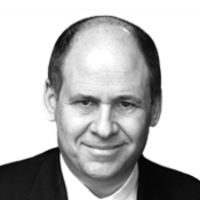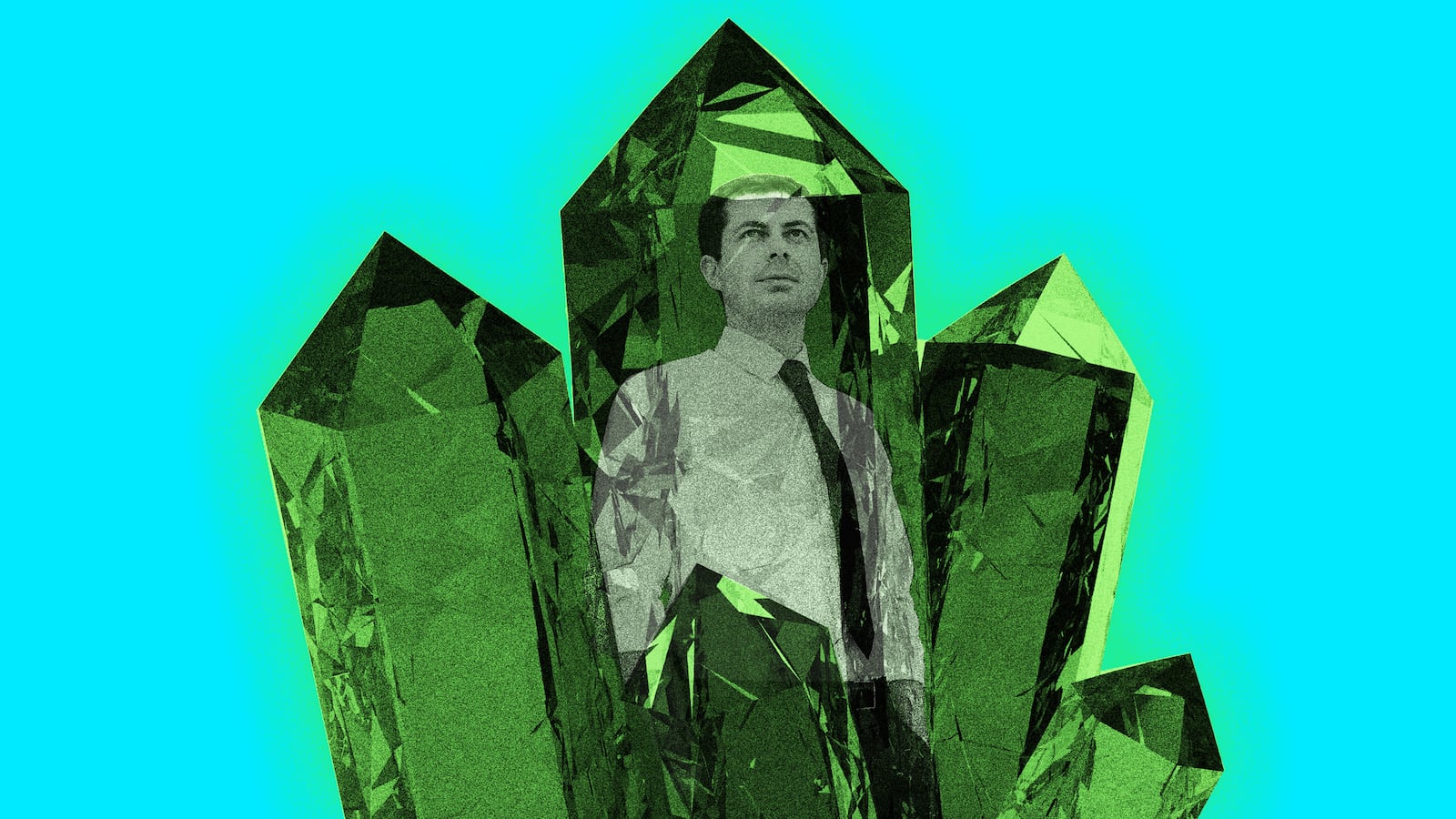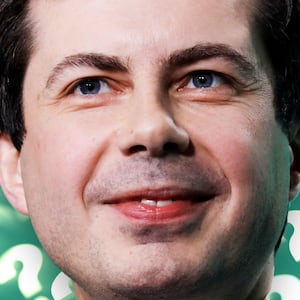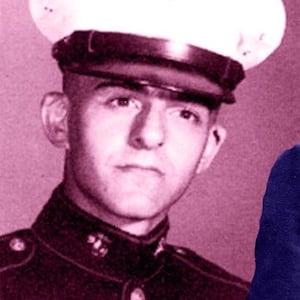Why is Pete Buttigieg suddenly everywhere? Why has he moved so quickly from obscure flavor of the month to serious contender for the Democratic nomination and the presidency? And why does a 37-year-old gay mayor of a small city in Indiana match up so well against President Trump?
The answers lie not only in his appeal as a fresh-faced, hand-crafted product of the heartland—a whip-smart artisanal candidate for the wine-and-brie part of the party; not only in his barrier-breaking age, sexual orientation, and unorthodox political experience, which have helped him stand out from the pack and allowed many Democrats to congratulate themselves for their open-mindedness; not only in his calm and, for a young guy, surprisingly authoritative comportment that can fairly be described as presidential.
Buttigieg is also going viral because in addition to Spanish, French, Italian, Maltese, Arabic, Farsi, and Norwegian, he speaks a compelling form of English. He is fluent in the subtext of American politics—the ideas and phrases that tap into our deeper sense of who we are and what we owe each other and future generations. At least for now, his generational and aspirational themes are working at a more powerful level than policy proposals or ideological positioning, and they lift him above the cut and thrust of the tiresome news cycle.
As he rushes to build an organization to match his message, Buttigieg understands that elections have long been games of capture the flag—struggles not only over the obvious symbols of patriotism but the less tangible yet hugely resonant values that lie somewhere in the hearts of almost all Americans. His ambitious goal in this election is to reclaim those founding ideals for himself and for the Democratic Party.
For decades, Republicans have mostly owned the values debate. They took the ancient battle cry of “For God and Country!” and extended it. In the second paragraph of his acceptance speech at the 1980 Republican Convention, Ronald Reagan told voters that they “share a community of values embodied in these words: family, work, neighborhood, peace and freedom.”
Reagan crushed Jimmy Carter that year and, in 1984, he trounced Walter Mondale, who (like some of today’s Democrats) thought progressive policy ideas alone could bring the party back into power. In 1988, the Democratic nominee, Michael Dukakis, ran on the arid theme of competence and lost to Vice President George H.W. Bush, who literally campaigned at a flag factory. Bill Clinton and Barack Obama—the only re-elected Democratic presidents in 75 years—succeeded by promising to, in Obama’s words, “turn the page” from the Bushes. But even though both gave some eloquent speeches and festooned their conventions with American flags, they made little progress in fusing the Democratic Party to the country’s deepest values.
Can Buttigieg? As a student at Harvard, he steeped himself in this challenge and even corresponded with George Lakoff, who writes perceptive books urging Democrats to improve their framing of issues. Now Buttigieg is engaged in a reclamation project for the principles he says “are simple enough to fit on a bumper sticker: freedom, security, and democracy.”
The irony—and tragedy—for Democrats is that Franklin D. Roosevelt virtually owned these three resonant words in the first half of the 20th century. In his brilliant “Four Freedoms” speech, delivered in 1941, he called for global freedom of speech and expression, freedom of religion, freedom from want, and freedom from fear—a speech Buttigieg cribbed from when announcing his candidacy in South Bend on April 14. FDR’s use of "security" began when he first ran for the New York state Senate in 1910 and eventually became "social security" and "collective security"—the pillars of American domestic and foreign policy for the next seven decades. He described the U.S. as the “arsenal of democracy” before World War II and, afterwards, Eleanor Roosevelt convinced the U.N. to adopt the “Universal Declaration of Human Rights,” which eventually helped globalize democracy.
In the interim, Democrats fumbled their own values. Beyond employing “freedom” briefly during the civil rights movement, they often avoided the word, perhaps because it smelled to them of fervid anti-Communists risking nuclear war to liberate Eastern Europe. They let Republican hawks make them seem soft on defense and “security.” And they dropped the ball on expanding democracy long enough for right-wingers to gerrymander districts and make it harder to vote.
Buttigieg’s campaign is about grabbing those ideas back and dashing for higher, non-ideological ground. He manages to apply “freedom” to health care, consumer protection, racial justice, education, union-organizing, women’s rights and gay marriage. It lets him place the laundry list of Democratic positions in an uplifting context. He does the same in connecting “security” to climate change, opposition to Trump’s wall and the threat of cyberattack. And in his hands, “democracy” becomes less an abstraction than a call to arms because “no issue we care about… will be handled well unless our democracy is in better shape.”
Buttigieg borrows heavily from Obama, down to describing the “audacity” of running for president on such a thin résumé. But his life story is in some ways more relevant than Obama’s to the anxieties of the fly-over states. “Our population shrank, and young people like me grew up believing the only way to a good life was to get out,” he told the South Bend crowd. “Many of us did. But then some of us came back. We wanted things to change around here.”
This goes right at how Trump won the election: the feeling in large swaths of Ohio, Pennsylvania and Wisconsin that Washington forgot about them. Buttigieg’s move home from Harvard, Oxford and McKinsey to help save his town carries a powerful unspoken message: I didn’t leave South Bend behind—and I won’t leave you behind, either. That’s a counter-narrative that goes beyond the turpitude of Trump.
The president has been strangely quiet about Buttigieg, tweeting nothing about his announcement. When someone steps outside the binary left/right markings, it confuses him. He’s like the playground bully briefly disoriented about where to find a younger kid’s weakness. Unlike the bullies of yesteryear, he can’t easily go after his homosexuality; almost every American nowadays has someone gay in their family or circle of friends, which is why Trump gave the LGBTQ community a shout-out at the Republican Convention in 2016. Even dog whistles—e.g. “He’s weak”—would backfire because Buttigieg served in Afghanistan and Trump was a draft dodger. Calling him a socialist wouldn’t stick; Mayor Pete’s answer is that nobody care if he was a Democrat or Republican when he filled potholes or went “outside the wire” protecting troops in Afghanistan.
If Buttigieg stays formidable, the president will eventually settle on some dumb insult that further demeans his office. But even Republicans like radio host Hugh Hewitt now see that Buttigieg makes for a much smaller target than many other Democrats—and a much more dramatic way to change the channel from a reality show already in danger of being cancelled. Voters often go to the other extreme of what they’ve just experienced: Old Ike to young Kennedy in 1960; the corruption of Watergate to moral Jimmy Carter in 1976; World War II veteran Bush to baby boomer Clinton in 1992; Obama to Trump in 2016.
Mayor Pete has some catching up to do on national issues. Right now, his web page features no policy positions at all. On the stump, he has proposed reorganizing the Supreme Court and abolishing the Electoral College, both of which would require constitutional amendments—a lengthy process. He’s right that wonky position papers don’t motivate voters—but he nonetheless needs a big issue (a national service and “climate corps” like John Delaney’s?) to put some policy meat on his elegant thematic bones.
Even as he looks forward to debates this summer where his quick mind will serve him well, Buttigieg remains an underdog. He has never faced a tough race before—an experience deficit more serious than his youth—so we have no idea if he can take a punch. (He lost a 2010 campaign for state treasurer by such a wide margin that his opponent never even had to attack him). His religious faith is appealing to many voters but may not be enough to win significant support from African Americans, who carry great weight in Democratic primaries. Few showed up to his announcement, though South Bend is 26 percent black. The National Baptist Convention, the largest predominantly African-American church in the United States, remains opposed to gay marriage. If he wins the nomination, he would need strong black turnout to dislodge Trump in November. He would also need tens of millions of older voters willing to add that their views on homosexuality had evolved.
So we don’t know yet who is best positioned to beat Trump. Any Democratic candidate who plays on a different field—who avoids the president’s angry terrain in favor of the sunny uplands where FDR, Reagan and Obama prevailed—will also have a good chance of beating him.
Rivals who are jealous of Buttigieg’s rapturous press coverage should stop rolling their eyes and borrow something from his debut. They, too, can speak in ways that move a nation.









